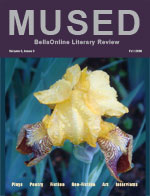Baseball Caps, Carbohydrates and Service Centers
Hannah Greenberg
The Age of Elegance is the span of life in which dangerous opportunities abound. More daunting than middle-age spread or the need to wear reading glasses is the possibility that we might, unwittingly, let go of our sense of self. The best response to this looming hazard is to proceed through our days and nights in a vigorously self-aware fashion.
We ought to embrace our baseball caps, in lieu of kowtowing to fashions in hair pieces, we ought to relish our consumption of white flour and white sugar, rather than slathering ourselves with the stress-causing guilt that we didnít eat baked quinoa, and we ought to stop regularly at service centers, both for our vehicles and for our psyches, instead of waiting until important components break down.
In brief, at this juncture, itís up to us to tend to ourselves. Reliance on our partners, on our parents, or on our children, yields unsatisfactory results, at best. Itís more than okay to advocate for our needs, to articulate our worth, and to watch over our expenditure of precious minutes; itís necessary.
We need to make our comprehension of the consequences of our choices as complete as the comprehension of any first-grader who knows which day she receives allowance. Similarly, we need to make our comprehension of the purpose of our behaviors as clear as the comprehension of any baby who knows the causal relationship between dropping carrots off of his highchair tray and receiving his familyís attention. Specifically, we need to mindfully select what we do and why we proceed accordingly.
At this stage, there still exist opportunities for our growth, for our personal magic. It is simultaneously the case that we have moved beyond specific points in time. Today, our deeds must count.
En route to this living-with-intentionality, our self-talk must be kind. Our evaluations, of ourselves, must be benevolent. We must champion us in the same manner we have already learned to champion others.
If we get passed over for a promotion, itís okay. If our teenagers sprout words that are uglier than their morning breath, thatís fine, too. If our neighbors decide, suddenly, that they donít like the posies we planted in our yards, their attitudeís not our problem.
More so, we need to see our chin hairs and our wrinkles as interesting or exotic, not as compromising. It would behoove us, as well, to honor our dwindling enthusiasm for performing office grunt work. We need to praise ourselves, also, tolerating overbearing relatives.
Whatís more, it would benefit us to greet ourselves pleasantly each morning, to list, mentally, or on paper, gratitude such as working lungs, the ability to ambulate and the power of speech. It would be good, too, to whisper, frequently, self- affirmations about completing housework.
Midlifeís a bridge. Let it be a passage between youthís self-esteem wobbles and ageís physical woes. We can decide to pick an accommodating attitude.

